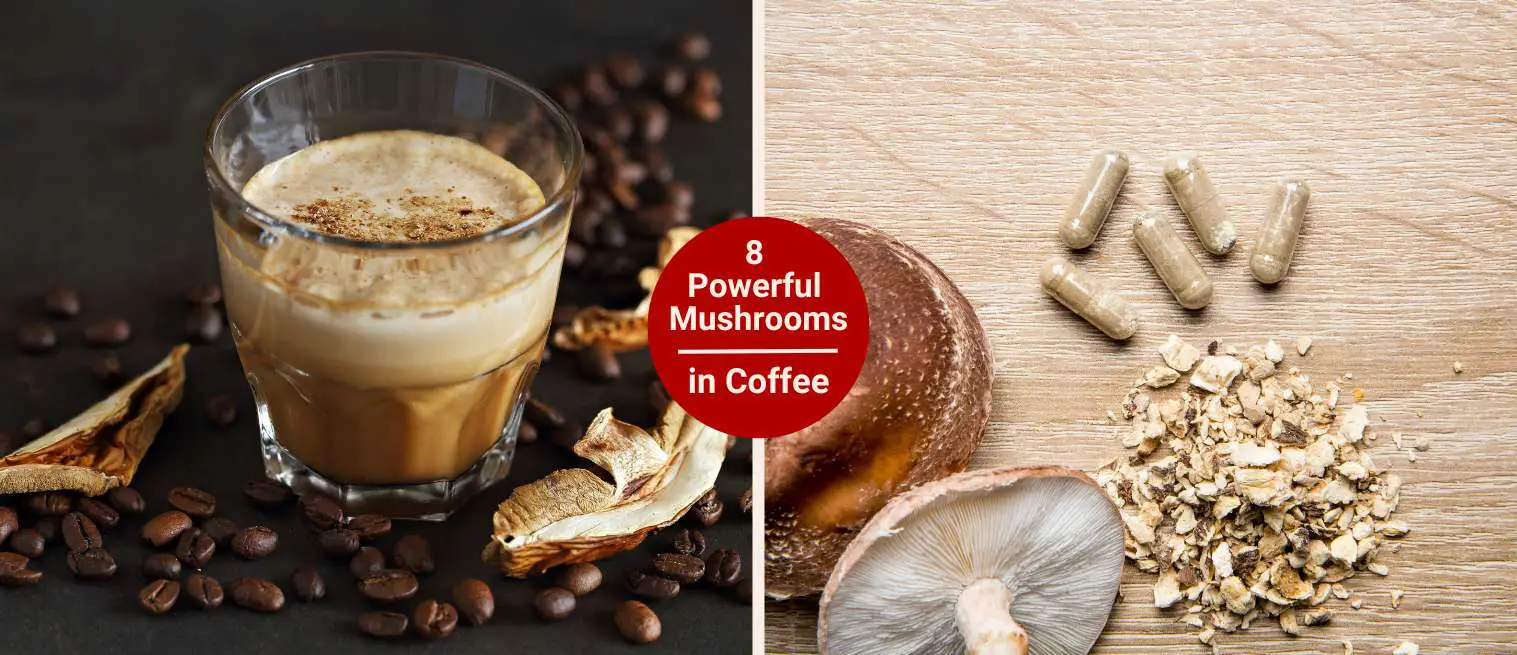8 Powerful Types of Mushrooms Used in Mushroom Coffee
Last updated on September 9th, 2025 at 10:32 am
Ever had coffee that made you feel more wired than focused? I sure have. Though I love coffee, and I mean love it. Some days it just didn’t love me back.
The jitters, the midday crash, that weird stomach feeling… it wasn’t every time, but enough to make me start looking for something smoother.
I wanted my morning coffee without the jitters or crash. That’s when I found mushroom coffee, such as Lion’s Mane, Chaga and Cordyceps. It sounded strange, but I gave it a shot.
In this guide, you’ll learn all about the best mushrooms used in mushroom coffee. Also, some brands that not only taste great but actually make a difference.
I’ll break down what they’re made of, how they taste, what benefits you can expect, and who should give them a try.
Mushrooms in Mushroom Coffee (Quick Table)
Here’s a quick table summarizing the 8 types of mushrooms used in mushroom coffee, along with their main benefits and potential drawbacks:
| Mushroom | Main Benefits | Potential Drawbacks |
|---|---|---|
| Lion’s Mane | Boosts focus, memory, and nerve health | Mild stomach upset in rare cases |
| Chaga | Strong antioxidant, immune support, may lower inflammation | Can interact with blood thinners and affect blood sugar |
| Cordyceps | Improves energy, stamina, and athletic performance | May cause dry mouth or digestive upset in high doses |
| Reishi | Calming, supports stress relief and immune system | May lower blood pressure and cause dizziness |
| Turkey Tail | Rich in polysaccharopeptides; supports immune function and gut health | Earthy flavor may not be for everyone |
| Maitake | May support blood sugar control and cancer defense | Can cause low blood sugar if combined with certain medications |
| Shiitake | Supports heart health, immunity, and provides key nutrients | Raw form may cause rash (shiitake dermatitis) in some people |
| Agaricus blazei | May boost immunity, reduce insulin resistance, antioxidant | Linked to liver issues in rare cases; possible GI discomfort |
Why Are Mushrooms Added to Coffee?
Yes, it sounds weird at first, but mushroom coffee is becoming a serious trend. So, why are these fungi sneaking into our mugs? Let’s break it down.
1 – The Rise of Adaptogenic Coffee
It’s all about adaptogens: natural substances that help your body handle stress better and bring balance to your system.
For instance, mushrooms like reishi, chaga, and lion’s mane are classic adaptogens. When added to coffee, they help smooth out the energy boost without the crash. In other words, you don’t get that sudden drowsiness that sometimes follows drinking regular coffee.
2 – Key Benefits: Focus, Immune Support
One big reason people add mushrooms to coffee is for the health perks. These mushrooms pack immune-boosting compounds, antioxidants, and natural brain boosters.
For example, lion’s mane is famous for supporting focus and mental clarity. Plus, some people find that mushroom coffee gives them steady energy. However, without the annoying jitters or anxiety that regular coffee sometimes causes.
Honestly, it felt like my brain was sharper, and my nerves calmer after switching to mushroom blends.
3 – How Mushroom Extracts Are Processed for Coffee Blends
Now, you might wonder how these mushrooms make it into coffee without tasting like mushrooms. Most companies use carefully extracted powders from hot water or dual extraction methods to pull out the beneficial compounds while reducing the earthy and bitter flavors.
The extracts are then finely ground and blended with coffee. I’ve tried a few brands, and some do a better job than others balancing flavor and benefits.
Pro tip: Start with a trusted brand and a smaller bag until you find your favorite blend. You can check out my top 9 mushroom coffee brands recommendations here.
8 Mushrooms Commonly Found in Mushroom Coffee
Let’s start with the one that made me go, “Wait… a mushroom that helps your brain?”
1 – Lion’s Mane (Hericium erinaceus)
The first time I heard about putting Lion’s Mane in coffee, I thought it was mostly hype. But I gave it a shot anyway, and after a few days, I did feel more focused and clear-minded.
The fact is Lion’s Mane mushroom contains two compounds, such as hericenones and erinacines. That stimulates nerve growth factor (NGF), helping the brain form new connections. It’s not just theory.
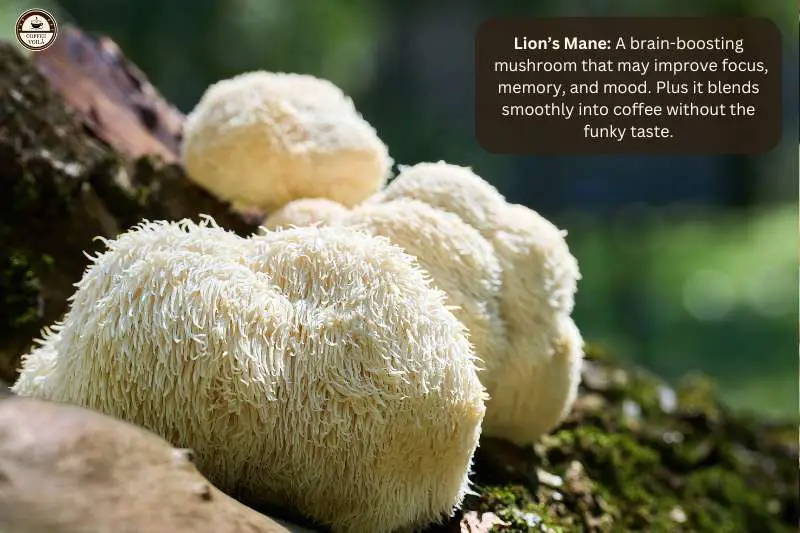
In a 2020 human study, participants with mild Alzheimer’s took 1 gram of Lion’s Mane daily and showed significantly better cognitive scores after 49 weeks compared to a placebo group.
And in one of the more unusual studies, post-menopausal women who ate Lion’s Mane cookies every day for a month reported reduced anxiety and irritation.
So there’s growing evidence that Lion’s Mane supports mental clarity, memory, and emotional balance.
What about coffee?
I’ve found it blends well; you don’t notice the funky mushroom flavor. Additionally, it has a slightly sweet and earthy flavor, rather than being savory or bitter, like some others.

I always look for dual-extracted fruiting body (not just mycelium) and preferably with a 1:1 or 8:1 ratio.
One brand I’ve had consistently good results with is Four Sigmatic’s Think Organic Ground Coffee. They use fruiting body only and are really transparent about their extraction process.
Other benefits…
Lion’s Mane may also help with nerve regeneration, gut ulcers, inflammation, and immune health. It even shows promise for managing diabetes symptoms by lowering blood sugar and protecting against nerve damage, at least in animal studies.
And despite its power, it’s generally safe unless you’ve got a mushroom allergy. Some rare cases of rash or breathing issues have been reported, so start slow if you’re unsure.
Notes: If you’re looking for a focus boost without extra caffeine, this is one of the most research-backed options on the adaptogen shelf.
2 – Chaga (Inonotus obliquus)
Chaga mushrooms grow on birch trees across cold regions like Siberia, Alaska, and Canada. They’ve been used for centuries in traditional medicine, mostly to boost the immune system and improve overall health.
What makes Chaga so impressive is its antioxidant properties. It’s packed with triterpenoids, melanin, polysaccharides, polyphenols, and flavans. These compounds are known to fight oxidative stress and reduce inflammation.
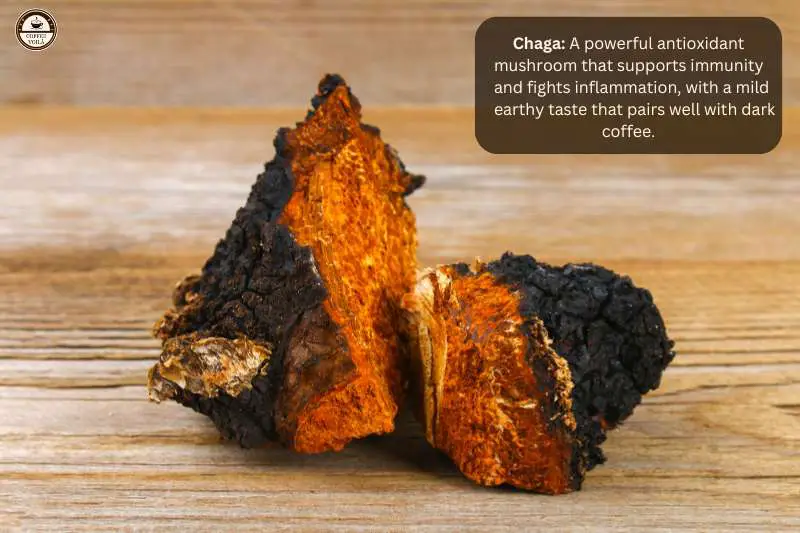
One of the standout benefits is how Chaga supports immune function. It helps regulate cytokines, which are chemical messengers that tell your white blood cells what to do.
That means your body responds better to threats, anything from a cold to something more serious. Plus, it may help calm overactive inflammation, which is tied to conditions like rheumatoid arthritis and even mood issues like depression.
There’s also research suggesting Chaga may help prevent and slow cancer growth. The antioxidants in it protect cells from damage, and concentrated triterpenes have shown the ability to kill cancer cells in lab settings. Again, most of this is early-stage science, but it’s compelling stuff.
Beyond that, Chaga’s been linked to lowering LDL cholesterol and improving HDL. Also, animal studies have shown that it can reduce blood sugar levels and insulin resistance, making it a potential ally for managing diabetes.
As a coffee ingredient?
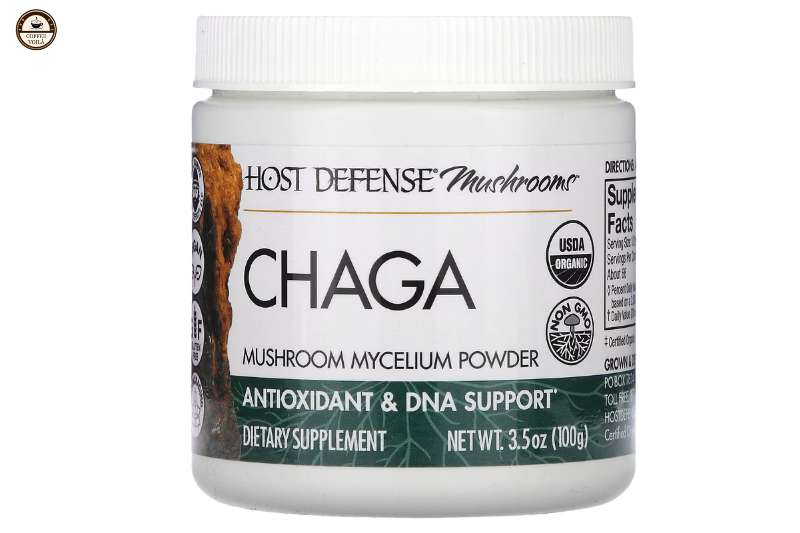
I’ve been using Host Defense’s Chaga powder. It’s made from organic mycelium grown on brown rice, and I find that a half teaspoon stirred into my morning coffee gives me a steady, calm energy and makes me feel more centered. It has a mild, earthy flavor that blends well with a medium or dark roast.
That said, it’s not for everyone. Chaga may interfere with blood clotting. So if you’re on anticoagulants or have a bleeding disorder, it’s best to be cautious. It also lowers blood sugar, which could be risky if you’re on insulin.
And if you’re pregnant, breastfeeding, or dealing with autoimmune issues, definitely talk to your doctor before making it part of your daily brew
Notes: Still, if you’re after something that supports immunity, helps with inflammation, and slips into your coffee like it’s meant to be there, Chaga is one to try.
3 – Cordyceps (Cordyceps militaris)
Cordyceps helps your body use oxygen more efficiently and supports ATP production (adenosine triphosphate, the molecule your cells use for energy), which is your body’s energy currency.
I noticed this most when I started adding a quarter teaspoon of Cordyceps powder to my pre-workout coffee. You also don’t feel jitters, only a clean stamina boost that somehow makes even a boring treadmill run feel easier.

But the real kicker is how Cordyceps supports adrenal health. When you’re stressed, this mushroom helps regulate cortisol and keeps you from feeling totally fried.
What about taste?
Cordyceps has a mild and earthy bitterness. I find it blends best with a medium roast and nothing too acidic. Just be sure to use a fruiting body extract if you can. Some cheap powders are mostly mycelium grown on rice, and those didn’t do much for me.
One note: Cordyceps does slightly thin the blood and may interact with medications for blood pressure or diabetes. So yeah, if you’re on anything like that, check with your doctor first.
But if you’re looking for more endurance, better oxygen use, or just a more “alive” feeling to your morning cup, Cordyceps is seriously worth trying.
4 – Reishi (Ganoderma lucidum)
Reishi has been used for centuries in Eastern medicine, and modern research supports many of its benefits. It supports the immune system by modulating white blood cells, including T-cells.
That’s a big deal for fighting off infections or staying balanced during allergy season.
It’s also known for its anti-cancer properties. Some early studies suggest compounds in Reishi (especially the spores and extracts) may help shrink tumors or boost immune responses in cancer patients.
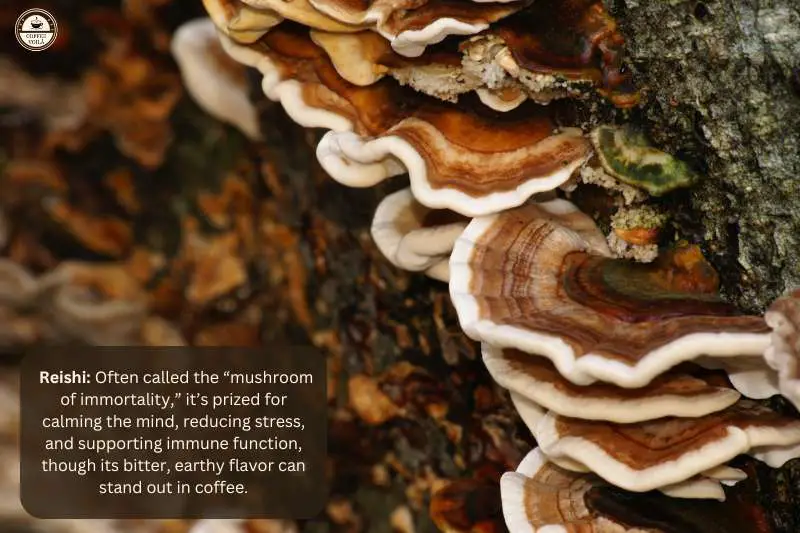
And while it’s not a replacement for real treatment, it’s something many people take alongside other therapies to better quality of life.
I’ve personally felt a difference in fatigue. After a few weeks of using it, I had better mental clarity and less afternoon burnout. That could be placebo, sure.
However, given that polysaccharides in Reishi have shown effects on mood and energy in clinical trials, I don’t think I imagined it. Some even report less depression and anxiety.
It may also help with cholesterol and blood sugar regulation. There’s some research (especially in animals) showing lower triglycerides, LDL, and better insulin response. Though results in humans are mixed, I still see it as a nice bonus.
What about flavor?
Well, Reishi is bitter and woody. You can thank the triterpenes and chitin for that.
But in coffee? It’s surprisingly doable. I usually brew it with a bold roast or blend it into a latte where milk tones it down. (You could try it with oat milk and a pinch of cinnamon; it kind of tastes like herbal mocha.)
Just be cautious with dosage. I stick to around 1 to 1.5 grams of extract daily.
The reason is too much, and you might deal with nausea, indigestion, or even loose stools. And if you’re on blood thinners or immunosuppressants or have liver issues, it’s a no-go without your doctor’s okay.
Notes: If you want something to support long-term wellness and mellow your mood while sipping your brew, Reishi is worth trying.
5 – Turkey Tail (Trametes versicolor)
Turkey Tail mushroom is one of those natural powerhouses that surprised me once I started digging into its benefits. This little fungus packs a punch, especially when it comes to boosting your immune system.
One of the coolest things I found is that Turkey Tail is loaded with antioxidants like phenols and flavonoids, which help reduce inflammation and protect your cells from damage.
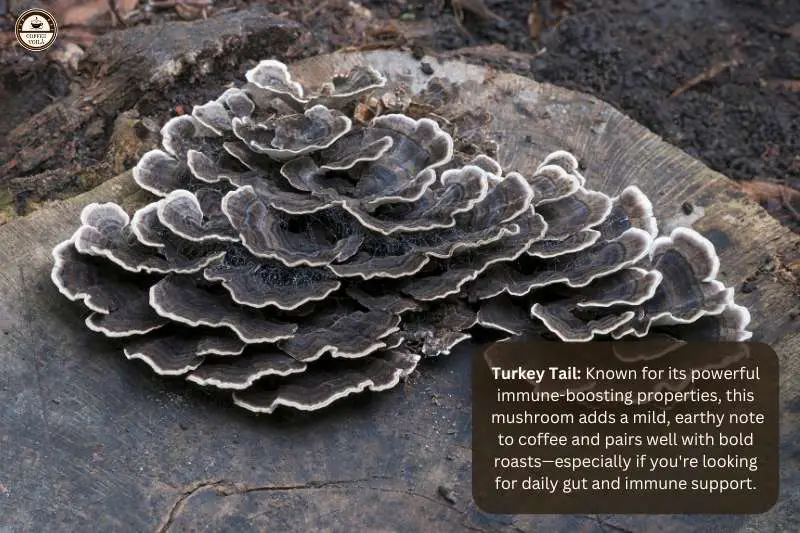
In other words, it helps your body fight off all sorts of nasty stuff that can wear you down over time.
Plus, it contains special compounds called polysaccharopeptides (PSK and PSP) that help activate your immune cells, such as natural killer cells and dendritic cells, which are your body’s first line of defense.
What about adding it to coffee?
Now, I tried adding Turkey Tail powder (like Host Defense) to my morning coffee. While the mushroom’s flavor is a bit earthy and woody, mixing it in with the rich, bold coffee masks a lot of the bitterness.
It gives the drink a smooth, almost comforting richness that I enjoy.
One tip from my experience:
Start with small amounts of Turkey Tail powder, like half a teaspoon, because its flavor can be strong if you’re not used to it.
Also, look for high-quality, purified supplements to avoid any contaminants. Some folks report mild digestive issues when first trying it, so it’s smart to ease in slowly.
Notes: Turkey Tail is an ally for your immune system and gut health, and it can even serve as a natural supplement during cancer treatments, according to some studies.
6 – Maitake (Grifola frondosa)
Maitake is rich in bioactive polysaccharides, such as D-fraction. This can help boost your immune system and may even help in fighting certain cancers by activating the body’s natural defenses.
One thing I found interesting is how Maitake seems to help with blood sugar and cholesterol Some animal studies suggest it can lower triglycerides and LDL (the bad cholesterol) without messing with your good cholesterol.
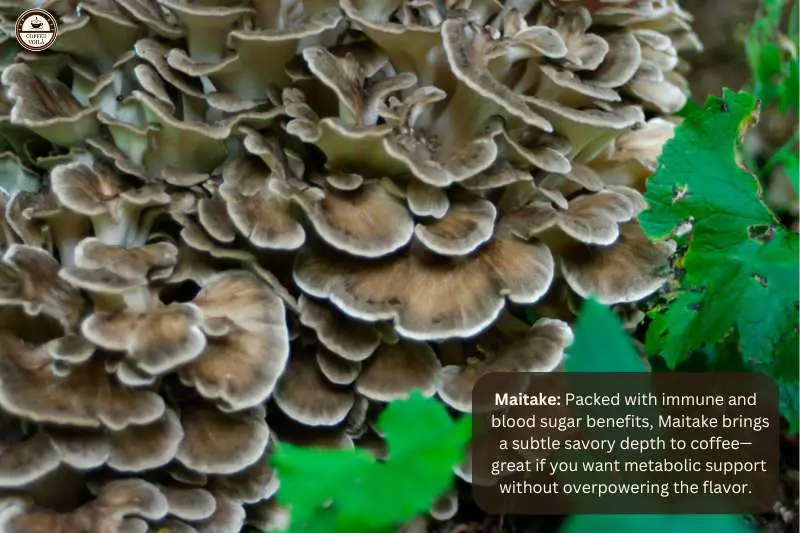
That’s a win for heart health, right? Though I have to admit, most of the human research is still catching up. So it’s wise to stay tuned for more solid evidence.
What about its flavor?
Maitake has this earthy, crunchy texture like a cross between wild game meat and mushrooms. Also, it’s got a subtle nuttiness that pairs surprisingly well with coffee.
Imagine brewing a cup that blends that rich, robust coffee taste with a mild, earthy undertone from Maitake powder or extract.
It’s not overwhelming or funky, just a smooth, grounding addition that kind of levels out the bitterness.
If you’re cooking with fresh Maitake, it’s great in dishes like pasta or stir-fries. Anyway, if you’re managing blood sugar or on meds, chat with your doc before taking it.
Notes: Maitake is great for your immune support and heart health, adding a unique flavor to your daily cup.
7 – Shiitake (Lentinula edodes)
This fungus has a rich, earthy, almost meaty flavor that adds depth to dishes, but did you know it also packs a serious health punch?
I first started cooking with shiitake mushrooms because they add a rich, savory flavor. Later, I found out they’re also great for your heart and immune system.
Shiitake mushrooms are loaded with compounds like eritadenine and beta-glucans that can help lower cholesterol and reduce inflammation. Both are important if you want to keep your heart ticking smoothly.
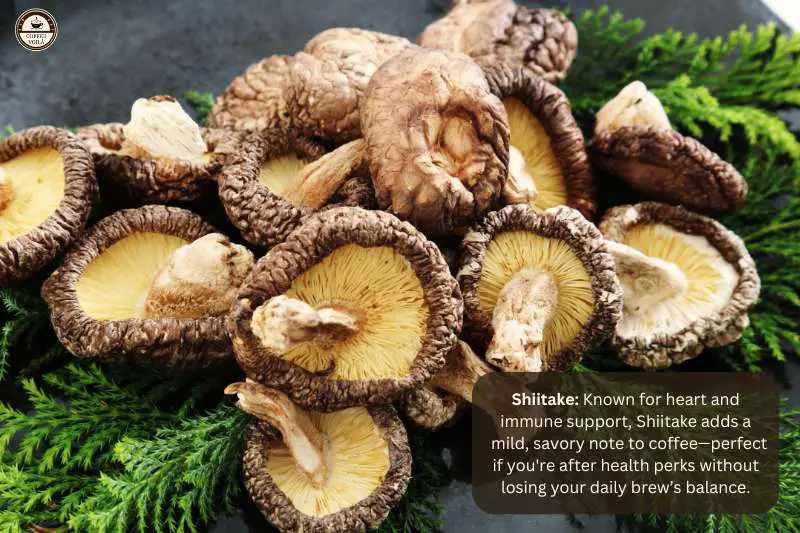
Plus, they’re a solid source of copper and selenium, which support blood vessels, bones, and your immune system.
Fun fact: just half a cup can give you a big chunk of your daily copper needs.
On the immune front, shiitake are rich in polysaccharides like lentinan, which help your white blood cells fight off infections and possibly even some cancers.
What about taste?
The mushroom’s earthy notes blend surprisingly well with the rich, roasted flavor of coffee. This creates a drink that’s both tasty and gives you a subtle boost in wellness.
Notes: Fresh shiitake stems can be tough. For this reason, I save them for veggie stock, and the caps are best sautéed or added to soups.
Also, if you’re new to shiitake, go slow. Some people can get a mild skin rash from raw ones, but cooking usually prevents that. Overall, shiitake mushrooms are a tasty way to sneak some powerful nutrition into your day, especially if you’re a coffee lover like me looking for that extra edge.
8 – Agaricus blazei (ABM or Agaricus subrufescens)
This mushroom originally comes from Brazil but is now grown in places like Japan, China, and the US. It’s pretty popular as both a food and a supplement. However, what grabbed my attention was its reputation for boosting the immune system and maybe even fighting tumor growth.
I started experimenting by adding ABM powder to my morning coffee, which is a bit unusual. The flavor is mild and earthy, which pairs well with the rich, roasted taste of coffee.
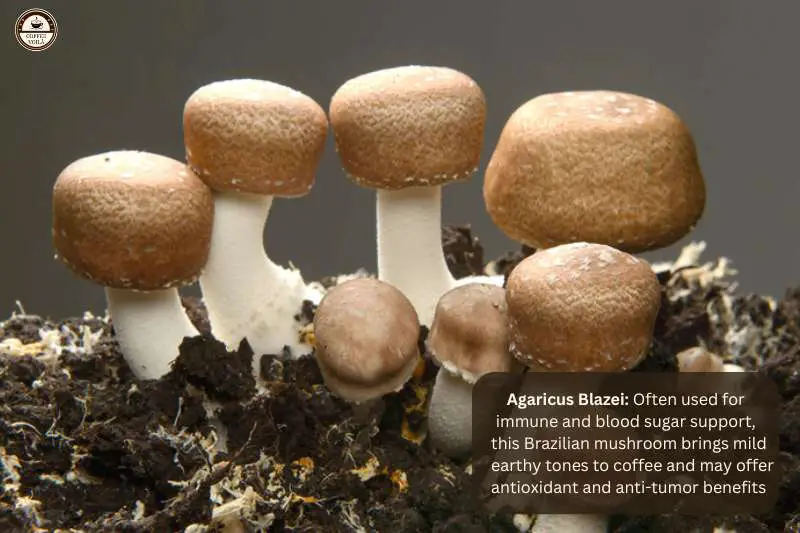
It doesn’t overpower the cup, but instead gives it a subtle depth, kind of like a natural health boost sneaking in with every sip.
I also enjoy the fact that Agaricus blazei helps regulate blood sugar and support overall immune health. Some people use it for everything from diabetes to heart health, though honestly, the science is still catching up.
It’s mostly based on animal studies, but the potential is promising.
Just a heads-up though, it can sometimes cause mild stomach issues or nausea. So, I’d recommend starting with small amounts and seeing how you feel.
If you’re considering ABM, look for high-quality supplements and chat with your doctor, especially if you’re on diabetes meds. This mushroom can lower blood sugar, and you don’t want to accidentally dip too low.
Last Thoughts
Have you tried mushroom coffee before? I’d love to know what blends you’ve tested or which mushrooms you’ve added to your routine and actually noticed a difference from. Whether it’s Lion’s Mane for focus, Cordyceps for stamina, or something more niche like Maitake or Agaricus, drop a comment and share your go-to!

